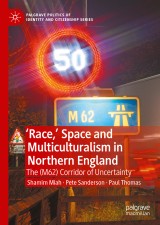Details

'Race,' Space and Multiculturalism in Northern England
The (M62) Corridor of UncertaintyPalgrave Politics of Identity and Citizenship Series
|
53,49 € |
|
| Verlag: | Palgrave Macmillan |
| Format: | |
| Veröffentl.: | 02.06.2020 |
| ISBN/EAN: | 9783030420321 |
| Sprache: | englisch |
Dieses eBook enthält ein Wasserzeichen.
Beschreibungen
<div><p>This book challenges the narrative of Northern England as a failed space of multiculturalism, drawing on a historically-contextualised discussion of ethnic relations to argue that multiculturalism has been more successful and locally situated than these assumptions allow.</p></div><div><p>The authors examine the interplay between ‘race’, space and place to analyse how profound economic change, the evolving nature of the state, individual racism, and the local creation and enactment of multiculturalist policies have all contributed to shaping the trajectory of ethnic/faith identities and inter-community relations at a local level. In doing so, the book analyses both change and continuity in discussion of, and national/local state policy towards, ethnic relations, particularly around the supposed segregation/integration dichotomy, and the ways in which racialised ‘events’ are perceived and ‘identities’ are created and reflected in state policy operations. </p></div><div><br></div><div><p>Drawing on the authors’ long involvement in empirical research, policy and practice around ethnicity, ‘race’ and racism in the Northern England, they effectively support critical and situated analysis of controversial, racialised issues, and set these geographically specific findings in the context of wider international experiences of and tensions around growing ethnic diversity in the context of profound economic and social changes.</p><br></div>
<p>1. Introduction: 'Race', Space and Place in Northern England.- 2. Failed Spaces of Multiculturalism?.- 3. Parallel Lives?.- 4. Policy: From Assimilation to Integration?.- 5. Black, Asian and the Muslim Cool.- 6. From the Oppressive Majority to Oppressed Minority? Changing White Self-identifications.- 7. Educated to be Separate?.- 8. Conclusion: Not Such a 'Failure' - A Multiculturalism Space in Development.</p>
<div><div>Shamim Miah is Senior Lecturer at the School of Education at the University of Huddersfield, UK.<br></div><div><br></div></div><div>Pete Sanderson is Professor of Education and Social Justice in the School of Education and Professional Development at the University of Huddersfield, UK. </div><div><br></div><div>Paul Thomas is Professor of Youth and Policy and Associate Dean of Research in the School of Education and Professional Development at the University of Huddersfield, UK.</div><div><br></div>
<div><div><p>This book challenges the narrative of Northern England as a failed space of multiculturalism, drawing on a historically-contextualised discussion of ethnic relations to argue that multiculturalism has been more successful and locally situated than these assumptions allow.</p></div><div><p>The authors examine the interplay between ‘race’, space and place to analyse how profound economic change, the evolving nature of the state, individual racism, and the local creation and enactment of multiculturalist policies have all contributed to shaping the trajectory of ethnic/faith identities and inter-community relations at a local level. In doing so, the book analyses both change and continuity in discussion of, and national/local state policy towards, ethnic relations, particularly around the supposed segregation/integration dichotomy, and the ways in which racialised ‘events’ are perceived and ‘identities’ are created and reflected in state policy operations. </p></div><div><br></div><div><p>Drawing on the authors’ long involvement in empirical research, policy and practice around ethnicity, ‘race’ and racism in the Northern England, they effectively support critical and situated analysis of controversial, racialised issues, and set these geographically specific findings in the context of wider international experiences of and tensions around growing ethnic diversity in the context of profound economic and social changes.</p></div></div><div><br></div>
Uses the authors’ own past and present empirical research around multiculturalist policy and practice operation in the region Draws on data from interviews specifically carried out for the book with community activists and policy practitioners who were involved in some of these key events Analyses historic local policy documents, reports and local community campaign materials
<p>“This book offers a carefully researched, intellectually bracing and politically important corrective to complacent discourses of British ‘failed multiculturalism,’ by examining the complex interplay between global, regional and local dynamics around race, place, economy and policy. Focused empirically on the ‘M62’ corridor of Northern England connecting Leeds, Hull and Manchester, the authors upend and dismantle the polarising representation of this region as a space of chronic conflict and disenchantment between anti-integrationist Muslims and ‘chavvy’ White xenophobes, marching toward an assured future of mutual marginalisation and defeat. Instead, they show how the gaps between idealised (or demonised) national policy aspirations and concrete local policy enactments create opportunities for Stuart Hall’s ‘double meanings’ of multiculturalism to come to life in all their messy complexity, marked by intercultural engagement and resilience as well as tension and despair. Through arefreshingly granular historical analysis, they also show why a supposed ‘corridor of failure’ is instead a ‘corridor of uncertainty,’ built around the contradictory lived experience of local cultural and economic dynamics. These local uncertainties are mirrored by national and indeed global uncertainties around how to deal with the social realities of burgeoning cultural diversity and economic upheaval, and the book provides an outstanding roadmap for navigating our way through the complex landscape of an often misrepresented and oversimplified social, cultural and economic terrain.”<i> </i>– Professor Michele Grossman, Deakin University, Australia</p>


















